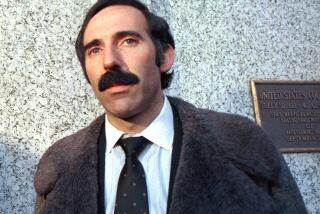Posner Back in Unwanted Spotlight : Link to Drexel Case Follows Lengthy Tax Evasion Fight
- Share via
A caller reaching a Miami Beach, Fla., telephone number listed as the headquarters of two well-known public companies is greeted by a recorded female voice announcing that the caller has indeed reached the number dialed, followed by instructions for using the phone mail system.
Eventually, a live voice politely inquires: “May I help you?” At no time will anyone state exactly what office has been reached.
The number is headquarters for DWG Corp., NVF Co. and several other entities controlled by Miami Beach corporate raider Victor Posner. The greeting symbolizes both the secretive and tangled nature of Posner’s financial empire, a style that has helped feed suspicion of the pioneering corporate raider since he emerged as a public figure more than 20 years ago.
Once again, the 69-year-old Baltimore native who began his climb to riches as 13-year-old helping his Russian immigrant father run a chain of grocery stores, is a figure in a case of alleged financial misconduct. This time the charges stem from the most intense investigation of insider trading ever conducted by the U.S. government. And, they come at a time when key parts of Posner’s financial empire are disintegrating. Moreover, Posner is still smarting from an eight-year battle against federal charges of tax evasion.
Posner, his son Steven, and Posner controlled-Pennsylvania Engineering Corp. were named Wednesday in a civil suit filed by the Securities and Exchange Commission against Drexel Burham Lambert Inc.
The suit accuses Drexel, one of the leading Wall Street brokerage houses, and Michael Milken, head of the firm’s Beverly Hills-based “junk bond” department, of insider trading, stock market manipulation and fraud. The charges against the Posners relate to alleged stock “parking” carried out by Drexel--in which the firm illegally concealed the Posners’ ownership of certain stocks--and to allegedly fraudulent dealings in Pennsylvania Engineering’s acquisition of stock in Fischbach Corp.
Attempts to reach Posner directly in Miami Beach and through his Washington attorney were not successful.
It was first revealed last year that the government might be probing a Posner transaction when New York stock speculator Ivan F. Boesky pleaded guilty to a felony charge of conspiring to make false statements to the SEC. The charge against Boesky--now serving a three-year federal prison term after agreeing to pay $100 million in fines--stated that he filed false documentation concerning his agreement to accumulate stock in Fischbach for an unidentified party.
At the time, Victor Posner was awaiting a new trial on charges that he conspired to inflate the value of 22 acres of land he donated to Miami Bible College in the 1970s. He was convicted of the charges in 1986, but was awarded a new trial after the judge learned that jurors had received prejudicial information.
However, a month before the scheduled retrial Posner pleaded no contest to the charges of evading $1.2 million in income taxes. The judge imposed a five-year term of probation, a $4.3-million fine and ordered that Posner give at least $3 million to fund a study of the poor and homeless in south Florida.
The latest SEC civil suit is not the first time the agency has accused Posner, or companies he controlled of wrongdoing. From 1971 to 1980, Posner-controlled companies were investigated three times.
In 1977, the agency accused Posner, his son Steven and other relatives of fraud in connection with benefits they received as corporate officers of certain companies. The agency said benefits such as a penthouse suite at the Plaza Hotel in New York were not properly reported to the government or stockholders. The Posners, without admitting or denying guilt agreed to consent decrees to settle the charges.
Increasingly in recent years, Posner has been accused of reaping generous salaries and benefits for himself, his children and his brother--all of whom have served as officers, or directors, of one or more Posner-controlled companies--while the companies themselves suffered financially.
Sharon Steel Corp., for years Posner’s main vehicle for corporate raids, last year filed for protection from creditors under Chapter 11 of the U.S. Bankruptcy Code. For the first time ever in late 1986, Posner was forced out of a company he controlled when Evans Products Co. reorganized under Chapter 11 protection.
Through companies he controlled, Posner has a part of such companies as Royal Crown, Arby’s Roast Beef and a South Carolina textile company.
More to Read
Inside the business of entertainment
The Wide Shot brings you news, analysis and insights on everything from streaming wars to production — and what it all means for the future.
You may occasionally receive promotional content from the Los Angeles Times.










